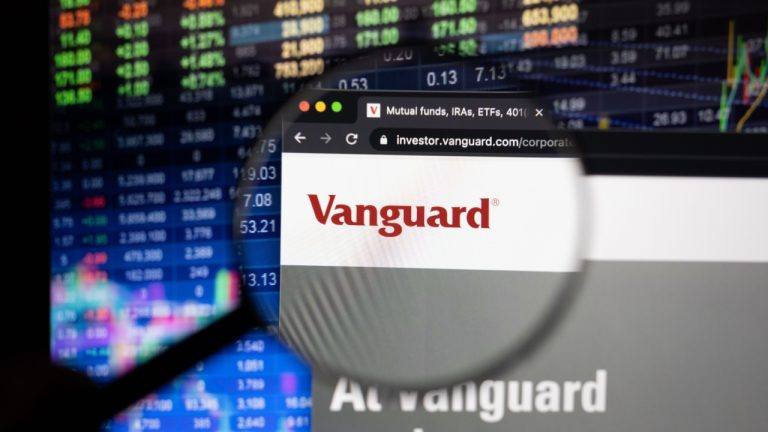 Vanguard, the second-largest ETF provider, has tripled down on its rejection of bitcoin and the crypto asset class, declaring that the merits of these digital assets are “weak” and based on speculation. Vanguard Belittles Bitcoin Yet Again: Might Make Investors Lose Money Even with the recent hike in price and interest for bitcoin and the […]
Vanguard, the second-largest ETF provider, has tripled down on its rejection of bitcoin and the crypto asset class, declaring that the merits of these digital assets are “weak” and based on speculation. Vanguard Belittles Bitcoin Yet Again: Might Make Investors Lose Money Even with the recent hike in price and interest for bitcoin and the […]

However, the impressive flows from BlackRock’s IBIT and Fidelity’s FBTC haven’t been enough to gain on the leading ETF asset manager by total flows, Vanguard.
BlackRock and Fidelity’s spot Bitcoin exchange-traded funds (ETFs) have accounted for a significant share of the issuers’ total ETF inflows this year.
The Bitcoin ETFs amount to 26% and 56% in year-to-date inflows for BlackRock and Fidelity respectively, according to Bloomberg ETF analyst Eric Balchunas, citing data from Bloomberg Intelligence.
BlackRock’s iShares Bitcoin Trust (IBIT) and the Fidelity Wise Origin Bitcoin Fund (FBTC) have seen $16.6 billion and $8.9 billion in inflows since they launched nearly five months ago, according to Farside Investor data.
Vanguard keeps investments like Bitcoin and Ethereum ETFs out of its offerings. Its decision is debatable but not new.
The post Bitcoin and Ethereum ETFs still off the table for Vanguard – it’s not surprising appeared first on Crypto Briefing.
 Salim Ramji, the new CEO of Vanguard and former head of Blackrock’s global ETF business, has affirmed the company’s position against launching a spot bitcoin exchange-traded fund (ETF), emphasizing the need for consistency with Vanguard’s investment philosophy that views crypto as a speculative and immature asset class. Despite Ramji’s prior involvement in launching Blackrock’s successful […]
Salim Ramji, the new CEO of Vanguard and former head of Blackrock’s global ETF business, has affirmed the company’s position against launching a spot bitcoin exchange-traded fund (ETF), emphasizing the need for consistency with Vanguard’s investment philosophy that views crypto as a speculative and immature asset class. Despite Ramji’s prior involvement in launching Blackrock’s successful […] Salim Ramji, a former executive at Blackrock renowned for his leadership in Ishares and Index Investments, and for overseeing the filing for Blackrock’s Ishares Bitcoin Trust, has been appointed the new CEO of Vanguard, signaling a potential shift in the asset management firm’s stance on cryptocurrencies. Ramji, set to replace Tim Buckley on July 8, […]
Salim Ramji, a former executive at Blackrock renowned for his leadership in Ishares and Index Investments, and for overseeing the filing for Blackrock’s Ishares Bitcoin Trust, has been appointed the new CEO of Vanguard, signaling a potential shift in the asset management firm’s stance on cryptocurrencies. Ramji, set to replace Tim Buckley on July 8, […]Salim Ramji set to be Vanguard's new CEO, igniting talks on the company's crypto policy with his prior Bitcoin ETF experience at BlackRock.
The post Vanguard set to appoint ex-BlackRock ETF chief as next CEO: WSJ appeared first on Crypto Briefing.
 After the U.S. investment advisor Vanguard chose not to offer spot bitcoin exchange-traded funds (ETFs), its CEO Tim Buckley, in a recent discussion, described bitcoin as a speculative asset, unfit for inclusion in long-term investment portfolios. Vanguard’s CEO Confirms: No Change in Bitcoin ETF Policy, Cites Speculation Concerns Reaffirming Vanguard’s perspective on bitcoin during a […]
After the U.S. investment advisor Vanguard chose not to offer spot bitcoin exchange-traded funds (ETFs), its CEO Tim Buckley, in a recent discussion, described bitcoin as a speculative asset, unfit for inclusion in long-term investment portfolios. Vanguard’s CEO Confirms: No Change in Bitcoin ETF Policy, Cites Speculation Concerns Reaffirming Vanguard’s perspective on bitcoin during a […] Despite the drop in value during the last three months, the leading crypto asset bitcoin is still the ninth most valuable asset in the world in terms of market capitalization. Moreover, bitcoin could flip some of the world’s most valuable assets in the future, as the crypto asset is 67% away from turning over tech […]
Despite the drop in value during the last three months, the leading crypto asset bitcoin is still the ninth most valuable asset in the world in terms of market capitalization. Moreover, bitcoin could flip some of the world’s most valuable assets in the future, as the crypto asset is 67% away from turning over tech […]
BTC demand via Grayscale Bitcoin Trust is dropping for several key reasons.
There is a reason why Grayscale Bitcoin Trust (GBTC) emerged as a benchmark to measure institutional interest in Bitcoin (BTC).
The digital currency investment product was among the only ones that offered hedge funds, endowments, pension funds, and family offices a way to gain exposure to Bitcoin without needing them to own the digital asset themselves.
Therefore, a rising capital inflow into GBTC — such as the one reported last year, wherein Wall Street investors deposited about $18.2 billion in the fund — served as a metric to gauge growing institutional interest in the crypto sector. Conversely, a declining capital inflow reflected institutional withdrawal or profit-taking, like the one happening since the first quarter of 2021.
On-chain analytics service Skew reported Thursday that GBTC stopped attracting fresh investments after February 2021. The capital inflows paused right when GBTC started trading at a negative premium to its net asset value, or NAV. NAV represents the underlying market value of the holdings.

The GBTC premium was upward of 30% at the beginning of this year. But the latest Skew chart pinpoints it at -11.40%. GBTC's premium to its NAV was min40.20% at its sessional low, its worst level in history.
Meanwhile, GBTC premium logged mild recoveries in early April after Grayscale announced its intentions to convert its trust structure to an exchange-traded fund (ETF). The New York firm's decision came in the wake of growing competition from then-newly launched ETFs in Canada, primarily as they offered better expense ratios than Grayscale's.
For instance, Purpose, the world's first physically settled Bitcoin ETF, surfaced with an expense ratio of 1%. Evolve and CI Galaxy, other Canadian Bitcoin ETFs, offered 0.75% and 0.40%, respectively. Meanwhile, Grayscale's expense ratio was a heightened 2%.
Business rivalries with Canadian Bitcoin ETFs might have also choked capital inflows into GBTC. Purpose, for instance, raked in $1 billion capital a month after its launch in February, reflecting that demand for Bitcoin investment products remained higher despite a plunge in GBTC's inflows.
The period also saw Bitcoin's spot rate riding higher on the Elon Musk factor. Following Tesla's revelation that it was holding $1.5 billion worth of BTC in its balance sheets, the cost to purchase one Bitcoin rose from as low as $38,057 on Feb. 8 to as high as $64,899 on April 14, with speculators believing that more corporates would replace a portion of their cash holdings with the flagship cryptocurrency.
But GBTC premium stayed negative during the course of Bitcoin's February-April price rally. Its minus 40.20% bottom appeared when BTC/USD started shedding its gains owing to profit-taking, China's crypto ban, and Tesla's Bitcoin dump rumors.

Daniel Martins, the founder of independent research firm DM Martins Research, highlighted the decline as a sign of waning Wall Street interest in Bitcoin-related investments, especially after the cryptocurrency became a clear victim of Musk's anti-Bitcoin tweets mid-May, losing more than half its valuation at one point later.
Martins further noted that Grayscale reported 500% higher annualized returns than Nasdaq, but its correction was also worse than the 2008's Great Recession — 82% vs. Nasdaq's 17%. That made Grayscale's bitcoin investment product an "ultra-leveraged bet," accompanied by an inferior risk-adjusted performance. The analyst added:
"GBTC's volatility has been nearly nine times as high as the Nasdaq's: 145% vs. 17%."
Martins' statements highlighted possibilities that GBTC premium could face further downside moves as investors hunt for more stable alternatives against Bitcoin's ongoing price correction.
Moreover, its rivalry from other digital currency investment alternatives, including cryptocurrency custodian services that offer institutional investors to own real crypto assets at a cheaper fee, further risks limited capital inflow.
ETF.com's analyst Sumit Roy wrote that the Grayscale fund's potential transition into an ETF ends its 2%-fee days as it would need to compete with an army of other ETFs, led by firms like Bitwise, Vanguard, Fidelity, Cboe, and others. He added:
"Yet regardless of what happens, GBTC is poised to be a force, and will likely stick around no matter how the crypto fund space evolves."
But whether the US markets would have access to a Bitcoin ETF in 2021 remains a mystery itself. Financial Times reported earlier this week that most ETF applications gather dust as the US Securities and Exchange Commission's chair Gary Gensler reiterated worries about investor protection in crypto markets.
“I expect that [delay] to happen with all of our filings, to be honest,” said Laura Morrison, global head of listings at Cboe.